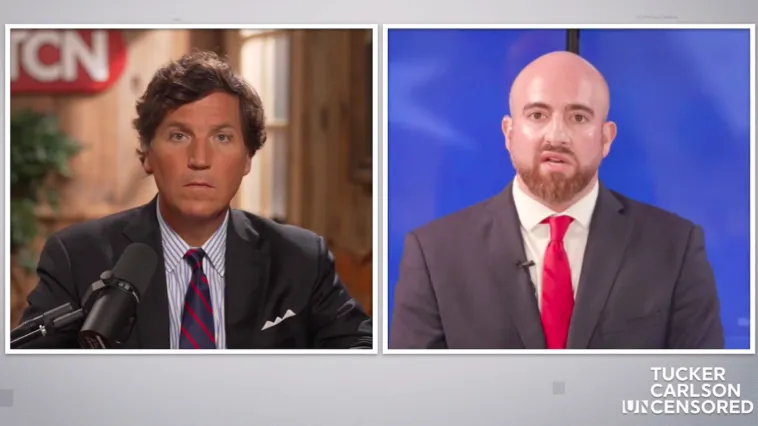(The Federalist) If you didn’t see Tucker Carlson’s interview last week with Mike Benz, you need to take an hour and watch the whole thing. In a mind-bending narrative about the emergence of what Benz calls “military rule” through an online censorship industry in the U.S., he lays out in startling detail just how corrupt and tyrannical the U.S. defense and foreign policy establishment has become.
Most importantly, Benz, the executive director of the Foundation For Freedom Online, explains how a constellation of federal agencies and publicly funded institutions, under the pretext of countering “misinformation,” rigged the 2020 election and are right now smothering the First Amendment and rigging the 2024 election through massive state-sponsored censorship online. The 2020 election and the Covid-19 pandemic, says Benz, were the “two most censored events in human history.” And 2024 is shaping up to be the same, thanks to the emergence of a federal censorship-industrial complex.
The problem here is profound, with deep historical roots that go back to the aftermath of World War II and the creation of the CIA along with a host of U.S.-funded international institutions. But for our purposes, it suffices to understand the problem in its two most recent stages: the period from 1991 to 2014, and from 2014 to the present.
At the outset of internet privatization in 1991, free speech online was seen as an instrument of statecraft. At that time, says Benz, internet free speech was championed by the U.S. foreign policy and defense establishments as a way to support dissident groups around the world in their efforts to overthrow authoritarian or disfavored regimes. It allowed the U.S. to conduct what Benz calls “insta-regime change operations,” in service of the State Department’s foreign policy agenda.
The plan worked really well. Among other things, free speech on the internet allowed U.S.-backed groups to assert control over state-run media in foreign countries, making it much easier to overthrow governments. The high-water mark of this way of deploying free speech online, Benz explains, was the Arab Spring in 2011 and 2012, when governments the Obama administration considered problematic — Egypt, Tunisia, Libya — all began falling in so-called Facebook and Twitter revolutions. During that time, the State Department worked closely with these social media companies to keep them up and running in those countries, to be used as tools for protesters and dissident groups that were trying to circumvent state censorship.
But all of that changed in 2014 after the U.S.-backed coup in Ukraine toppled the government of Viktor Yanukovych and there was an unexpected pro-Russia counter-coup in Crimea and parts of eastern Ukraine. Later that same year, says Benz, when the people of Crimea voted to be annexed into the Russian Federation, “that was the last straw for the concept of free speech on the internet in the eyes of NATO.”
Thereafter, NATO, the CIA, and the State Department, together with the intelligence agencies of our European allies, did an about-face on internet free speech. They began instead to engage in what amounted to hybrid or information warfare to censor what they saw as Russian propaganda online. These efforts quickly spread beyond Ukraine and Eastern Europe to include the censorship of populist groups on the right that were emerging across the EU as a response to the Syrian migrant crisis.
By the time Brexit emerged in the summer of 2016, explains Benz, NATO and the foreign policy establishment felt there was a real crisis afoot; the problem was spreading west from Central and Eastern Europe, and it had to be stopped. If it wasn’t, then Brexit might trigger the collapse of the entire EU, along with NATO and the entire constellation of supranational institutions that relied on NATO. The entire postwar architecture of institutions might come crashing down, all because the hearts and minds of the people were being swayed. So went the thinking, anyway. As far as the national security establishment was concerned, citizens were being swayed by Russian and far-right propaganda, and we can’t have that.
Under these circumstances, free speech was the last thing that could be allowed to flourish online. Censorship became the order of the day. As Carlson put it, these NATO and EU leaders identified their new enemy as democracy within their own countries — their own voters, in other words: “They feared that their people, the citizens of their own countries, would get their way. And they went to war against that.”
And then Trump was elected. From that moment — and indeed, as we know from the Russia-collusion hoax, even before Trump was elected in November 2016 — the U.S. foreign policy and defense establishments, which had done so much to censor and weaponize the internet overseas, turned their attention to American citizens.






